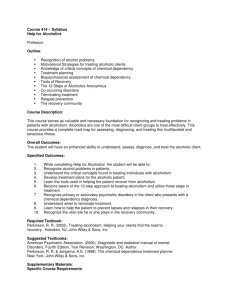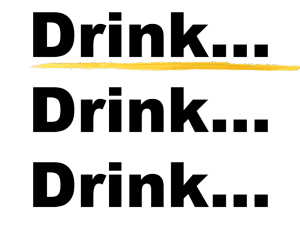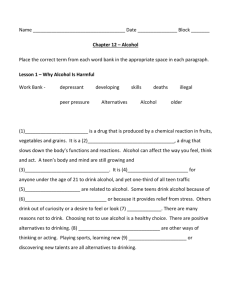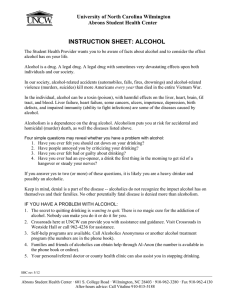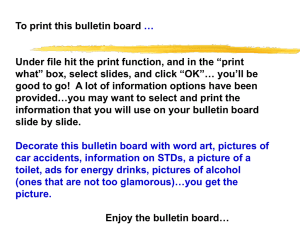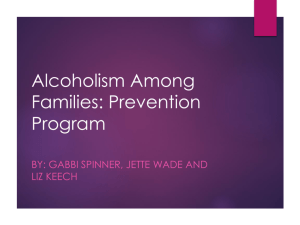ruHm Alcoholism: Nature vs. Nurture NUCATION
advertisement
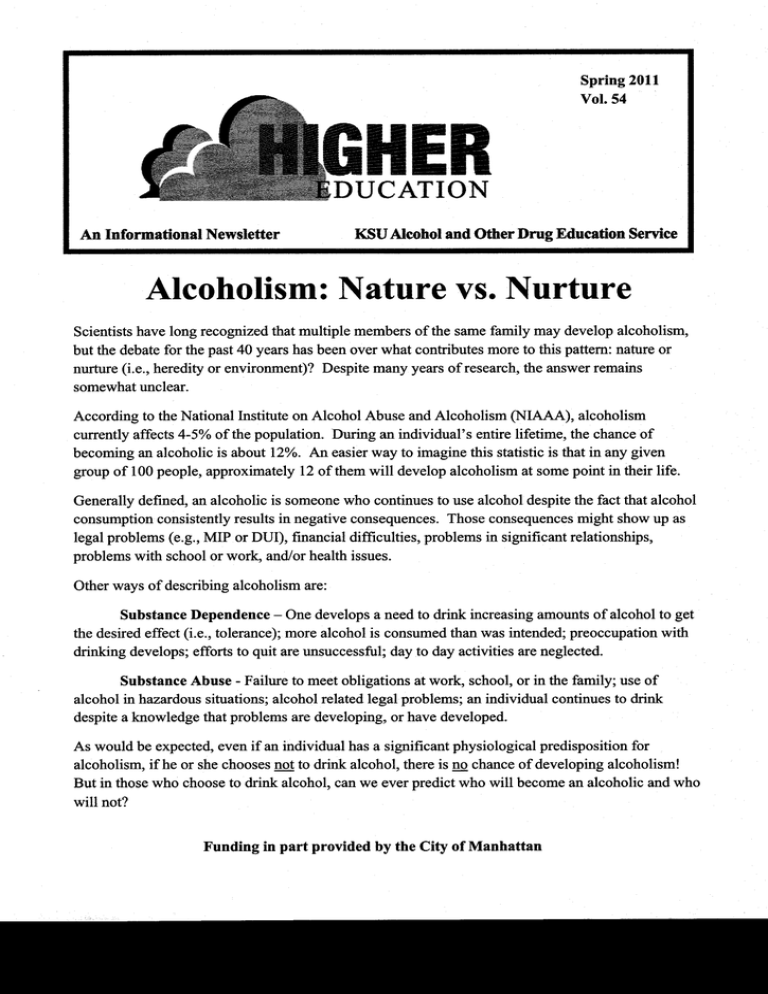
Spring20ll Vol.54 ruHm NUCATION An Informatio**l New letter K$UAlcohol nnd $tlmr Drug Education$ervfu* Alcoholism:Naturevs.Nurture Scientistshave long recognizedthat multiple membersof the samefamily may develop alcoholism, but the debatefor the past 40 years has been over what contributesmore to this pattem: nature or nurture (i.e., heredity or environment)? Despite many years of research,the answerremains somewhatunclear. According to the National Institute on Alcohol Abuse and Alcoholism (NIAAA), alcoholism currently affects 4-5% of the population. During an individual's entire lifetime, the chanceof becoming an alcoholic is about l2%. An easierway to imagine this statistic is that in any given group of 100 people, approximately 12 of them will develop alcoholism at somepoint in their life. Generally defined, an alcoholic is someonewho continuesto use alcohol despitethe fact that alcohol consumptionconsistentlyresults in negative consequences.Those consequencesmight show up as legal problems (e.g., MIP or DUI), financial difficulties, problems in significant relationships, problems with school or work, and/or health issues. Other ways of describing alcoholism are: Substance Dependence- One developsa need to drink increasingamountsof alcohol to get the desiredeffect (i.e., tolerance);more alcohol is consumedthan was intended;preoccupationwith drinking develops;efforts to quit are unsuccessful;day to day activities are neglected. Substance Abuse - Failure to meet obligations at work, school, or in the family; use of alcohol in hazardoussituations;alcohol related legal problems; an individual continuesto drink despitea knowledge that problems are developing, or have developed. As would be expected,even if an individual has a significant physiological predispositionfor alcoholism, if he or she choosesnot to drink alcohol, there is no chanceof developing alcoholism! But in thosewho chooseto drink alcohol, can we ever predict who will becomean alcoholic and who will not? Funding in part provided by the City of Manhattan Family HistorY It is generallybelieved that there are many factors that contribute to someonedeveloping a dependencyon alcohol,but a family history of alcoholismseemsto be a strongpredictor. Family studieshave provided important information about the way alcoholism may be passeddown. Childrenof alcoholicswho were adoptedat birth and had no contactwith the alcoholicparent developedalcohol dependencemore frequently than adoptedchildren whose birth parentswere not alcoholic.Other studieshave shownthat 18% of boys whoseparentsare alcoholicdevelop alcoholism;this rate is four timeshigher thanboys with non-alcoholicparents' In fact, studiesof identical twins who have been adopted,and who sharevirtually the samegenetic make-up,have led to a better understandingof the genetic componentof alcoholism. Identical twins show a much strongersimilarity to one anotherin alcohol use patterns,even if they are raised separatelyin different families, with different drinking or non-drinking environments,and in different social situations. Current researchsuggeststhat about 50-60%of the risk of developing alcoholism can be attributed to genetics. A personwith a family history of alcoholism is said to inherit a geneticpredisposition to alcoholism- a higher likelihood of becomingalcoholdependent.Someexpertssuggestthat children of alcoholic parentsare three to four times more likely to becomealcohol dependentthan children with non-alcoholicparents. It is generallybelieved that the remaining risk factors for developing alcoholism are environmentalor psychological,suchas exposureto alcohol,modelingbehavior,antisocialtendencies,or mental or psychologicaldeficienciesor challenges. Personality Personalitytraits are part inherited and part learned. Scientistshave not been able to identifu a specific personality type that is more prone to alcohol dependency,although certain traits may be associatedwithhigh alcoholuse. Low self-esteemis sometimescorrelatedwith alcohol dependency, as is risk-taking or poor impulse control. Individuals who experiencedepression,anxiety, or phobias are also often at higherrisk for developingalcoholdependence.Debatecontinues,however,over which comesfirst! Is a depressedor anxiouspersonmore likely to use alcoholto relievetheir symptoms?Or, is a personwho abusesalcoholmore likely to becomedepressedand anxious? These haven't definitively answered. are questionsthat researchers Environment All individuals grow up in a cultural environmentas well as a family environment. An acceptanceof heavy alcoholuse may be a part of one's ethnic,religiousor socialupbringing. One study estimated a personwas 50olomore likely to drink heavily if he or shehad friends and family memberswho also drank heavily. Genetics Those with a family history of alcoholism may inherit a susceptibility to becoming alcoholic, but what exactly does one inherit that leads to potential alcohol dependency?Many theorieshave been proposed,and researchcontinuesto reveal possibletraits that may be responsible. Below are some of the genetic traits that researchindicatesmay increaseone's risk for developing alcohol dependency: r Differences in how alcohol is metabolized by the body - There are geneticvariations in how individuals processthe alcohol they drink, and this appearsto be linked to the existence of certain liver enzymes. Becauseof theseenzylnes,some individuals will have a negative reaction to alcohol (e.g., nauseaor elevatedheart rate) and are therefore less likely to develop dependency. o Brain response to alcohol - Certain genesmay influence the way the brain's neurotransmittersrespondto the presenceof alcohol, impacting how likely it is that one becomesaddicted. o Pleasure sensors - Some individuals may experiencea greaterpositive mood reaction to alcohol, increasingthe likelihood that they will want to consumemore alcohol. Scientists believe this may be related to the releaseof endorphins(the chemicalsthat reducepain). The strengthof endorphinresponseto alcohol can vary from personto person. o Sensitivity to odors - The responseto the aroma of alcohol can vary basedon a certain gene. Individuals who find alcohol especiallyrewarding will respondstrongly to the way it smells, which can often trigger cravings. r Brain chemical levels - Those who becomealcohol dependentmay have lower levels of the naturally occurring chemicalsthat relieve pain and createa senseof exhilaration. They may use alcohol or other drugs to createthe sensationsthey desire. o Withdrawal sensitivity - Genetic traits may influence how severethe withdrawal symptoms are when an individual attempts to reduce or quit alcohol consumption. When symptoms are severe,one is less likely to want to quit. o Sweet cravings - Recent studieshave looked at the connectionbetweencravings for sweet, sugary foods, and alcohol dependence.Children of alcoholics often seemto inherit a tendencyto become addictedto sweets.Sugar can act as a mood elevator,and children who "self-medicate" with sugarmay develop similar cravings for alcohol later in life. A Combinationof Factors Most expertswould agreethat it is probably a combination of all thesefactors - family history, personality, environment,and geneticpredisposition- that leadsto someonebecoming an alcoholic. Interestingly, alcoholism can sometimesappearto skip a generationin families. For example,as a result of exposureto negative alcohol-relatedbehaviors from their parentsduring childhood, adult children of alcoholics, even though they have inherited the geneticrisk for alcoholism, will chooseto avoid all use of alcohol for themselves. They may also work hard to prohibit the use of alcohol by their children. However, if their children, who have also inherited the geneticpredispositionfor alcoholism, use alcohol, they may quickly develop alcohol abuseor addiction. Earlv Alcohol Use According to datafrom the NationalEpidemiologic Surveyon Alcohol and RelatedConditions,early alcoholuse increasesthe risk of developingalcohol later in life. Data analysisshows dependence that approximatelyhalt(47%) of individualswho starteddrinking before age 14 were alcohol dependent at some point in their life, and l3o/o were dependentin the past year. For those who began drinking after age 20, thosenumbersare9Yoand2Yo respectively.This researchsuggeststhat the longer you wait to begin drinking alcohol, the less likely you will be to becomedependenton alcohol in your lifetime. Percentageof U.5,AdultsAged18 and Older Dependenton Alcohol(in lifetime), by Ageof DrinkingOnset 100 13 1,4 15 L5 1,7 18 1-9 20 21+ AgeEeean Drinking In addition to the risk of becoming alcohol dependent,adolescentdrinkers may also be harming certain areasof the brain that are still developing and maturing during this time. The prefrontal cortex(anareaat the front of the brain involved with decision-makingand planning)is one of the last areasto mature,and it undergoessignificant changesduring adolescence.In fact, the brain is not fully matureuntil age25. Researchstudiessuggestthat alcoholuseby teensand young adultsmay interfere with brain development,and could causelasting damage. RESOURCES KSU Counseling Services English/CounselingServicesBldg. Phone:532-6927 KSU Alcohol & Other Drug Education Service Director: Bill Arck 214 English/CounselingServicesBIdg. Phone:532-6927 Alcoholics Anonymous Noon Meeting (Mon.-Sat.) Blue Valley United Methodist Church 835 ChurchAve. Phone: 531-9260 Higher Educationis a putlication of the KSU Alcohol and Other Drug Education Service,EnglisVCounseling ServicesBIdg., KansasStateUniversify, Manhattan,KS 66506. (785)532-6927.An equal opporhrnity employer. Director:Bill Arck, M.S.; AssistantDirector:Julie Hamel, M.S. Alcohol and Other Drug Education Service 2 l4 English/Counseling ServicesBldg. KansasStateUniversity Manhattan,KS 66506-6503 (78s)s32-6921 The intent of Higher Education is to provide accurate, timely information representing the cun?nl state of alcohol/drug knowledge. Keep in mind lhat researchon thesematters continues daily and is subject to change. It is our intention to keep you inforned, not to diagnose or treat illness. For personal alcohol and other drug problems, please consult your physician or counselor. We send "Higher Education" newsletter to a cross section of faculty and staff in KSU departments with labels generated through Human Resourcesin Edwards Hall. If a newsletter is addressedto someoneno longer employed in your department, please forward it to someoneelsewho did not receive one. Thanks!
